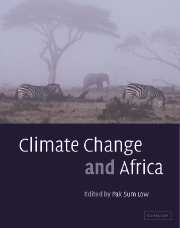Book contents
- Frontmatter
- Contents
- Notes on contributors
- Peer reviewers
- Editor's note
- Foreword
- Foreword
- Foreword
- Foreword
- Preface
- Preface
- Preface
- Preface
- List of abbreviations
- List of SI prefixes
- List of unit abbreviations
- List of chemical formulae
- Part I Science
- Part II Sustainable energy development, mitigation and policy
- Part III Vulnerability and adaptation
- 18 Potential impacts of sea-level rise on populations and agriculture
- 19 Sea-level rise and coastal biodiversity in West Africa: a case study from Ghana
- 20 The impacts of ENSO in Africa
- 21 Climate policy implications of the recent ENSO events in a small island context
- 22 El Niño causes dramatic outbreak of Paederus dermatitis in East Africa
- 23 The role of indigenous plants in household adaptation to climate change: the Kenyan experience
- 24 Requirements for integrated assessment modelling at the regional and national levels in Africa to address climate change
- 25 Climate and disaster risk reduction in Africa
- Part IV Capacity-building
- Part V Lessons from the Montreal Protocol
- Index
19 - Sea-level rise and coastal biodiversity in West Africa: a case study from Ghana
Published online by Cambridge University Press: 10 December 2009
- Frontmatter
- Contents
- Notes on contributors
- Peer reviewers
- Editor's note
- Foreword
- Foreword
- Foreword
- Foreword
- Preface
- Preface
- Preface
- Preface
- List of abbreviations
- List of SI prefixes
- List of unit abbreviations
- List of chemical formulae
- Part I Science
- Part II Sustainable energy development, mitigation and policy
- Part III Vulnerability and adaptation
- 18 Potential impacts of sea-level rise on populations and agriculture
- 19 Sea-level rise and coastal biodiversity in West Africa: a case study from Ghana
- 20 The impacts of ENSO in Africa
- 21 Climate policy implications of the recent ENSO events in a small island context
- 22 El Niño causes dramatic outbreak of Paederus dermatitis in East Africa
- 23 The role of indigenous plants in household adaptation to climate change: the Kenyan experience
- 24 Requirements for integrated assessment modelling at the regional and national levels in Africa to address climate change
- 25 Climate and disaster risk reduction in Africa
- Part IV Capacity-building
- Part V Lessons from the Montreal Protocol
- Index
Summary
Keywords
Ghana; sea-level rise; biodiversity; coastal; ecosystem; erosion
Abstarct
Available evidence points to an eventual rise of sea level for coastal areas as a result of global warming. Sea-level rise would introduce or aggravate existing threats to the continued survival of the biodiversity of low-lying coastal areas. In Ghana and the coastal states of West Africa, vulnerable habitats include the strand zone, lagoons, wetlands, and intertidal sandy and rocky areas. Physical and biological parameters of several of these habitats would change substantially as a result of submersion and increased salinity regimes. This would adversely affect, for example, the habitats of water birds, nesting beaches of sea turtles, and the brackish-water dependent fauna and flora of the estuaries and lagoons. Species extirpation leading to local loss of genetic diversity is envisaged to affect fauna like ghost crabs (Ocypoda spp.) and the fiddler crab (Uca tangeri). Plants in this category include five species of true mangroves (Rhizophora racemosa, R. harrisonii, R. mangle, Avicennia germinans and Laguncularia racemosa) and their associates (Conocarpus erectus, Acrostichum aureum and the uncommon creeper, Phylloxerus vermicularis). Strategies that would mitigate or protect biodiversity of the coastal zone from the anticipated effects of rising sea level are advanced. The potential role of coastal infrastructures in biodiversity conservation is addressed.
- Type
- Chapter
- Information
- Climate Change and Africa , pp. 204 - 217Publisher: Cambridge University PressPrint publication year: 2005
- 13
- Cited by



